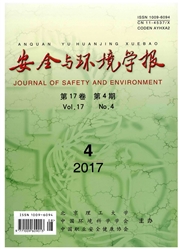

 中文摘要:
中文摘要:
为了解灌溉水中藻毒素(MCs)潜在风险,该实验研究了不同浓度(1、100、1 000、3 000μg/L)MCs对水稻种子萌发、糖代谢、呼吸速率和抗氧化系统的影响。结果表明,MCs处理7 d后,水稻种子各指标变化与MCs处理浓度有关,呈"低促高抑"现象。1μg/L MCs处理下,种子芽长增加,呼吸速率、过氧化物酶活性、抗坏血酸含量上升,丙二醛、过氧化氢、过氧化氢酶活性无明显变化;当MCs处理浓度为100μg/L时,种子发芽率和活力指数下降,其余指标变化与1μg/L MCs处理组近似;当MCs浓度≥1 000μg/L时,种子萌发生长指标均降低,α、β-淀粉酶活性下降,呼吸速率降低,抗氧化酶系统明显受抑,活性氧积累,膜脂过氧化,种子萌发受抑。
 英文摘要:
英文摘要:
To understand the potential risk of microcystin(MCs) in irrigation water, effects of MCs at different concentrations of 1,100,1 000,and 3 000 μg/L on growth,sugar metabolism system,respiration rate and its antioxidant system of rice seed were studied. Results showed that the change of each index was correlated with MCs treated concentration,low concentrations MCs would promote rice seed germination,while high concentrations MCs would inhibit this process. MCs at the concentration of 1 μg/L increased the length of bud,respiration rate,POD and As A in rice seed.Meanwhile,MDA,H2O2 and CAT did not change significantly. MCs at 100 μg/L decreased the germination rate and vigor index of rice seed,and the changes of other indexes were similar to the 1 μg/L MCs group. High concentrations MCs(≥1 000 μg/L)not only decreased the germination and grown index of rice seed,but also inhibited(α,β)-amylase activity of sugar metabolism system. The respiration rate was also decreased,and antioxidant system was inhibited significantly. The accumulation of reactive oxygen species lead to plasma membrane peroxidation,inhibited the physiological metabolism of the germination process of rice seed.
 同期刊论文项目
同期刊论文项目
 同项目期刊论文
同项目期刊论文
 期刊信息
期刊信息
